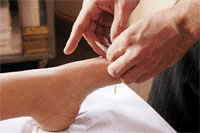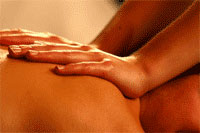

What is Acupuncture?
Acupuncture is an ancient form of medicine that is becoming more popular due to its effectiveness, simplicity and absence of side-effects. This method of health care, which has been tested, revised and improved continually for thousands of years, has evolved into a complete and holistic medical system. Practitioners of acupuncture and Chinese medicine have used this non-invasive medical system to help millions of people become well and stay well.
An acupuncturist will place fine, sterile, hair-like needles at specific points on the body. The stimulation of these points affects both the central and peripheral nervous systems, thus triggering the release of the body’s own chemicals to relieve pain or resolve other health disorders. Acupuncture promotes natural healing by enhancing the body’s own recuperative powers, thus boosting immunity, improving physical and emotional health and enhancing overall function and well-being. Acupuncture is a safe, painless and effective way to treat a wide variety of medical problems.
What is Qi and how does it move?
At the core of this ancient medicine, is the philosophy that Qi, (pronounced “chee”) or Life Energy, flows throughout the body. Qi animates the body and protects it from illness, pain and disease. A person’s health is influenced by the quality, quantity and balance of Qi.
Qi circulates through specific pathways called Meridians. There are 14 meridian pathways throughout the body. Each is connected to specific organs and glands. Meridian pathways are like rivers. Where a river flows, it transports life-giving water that nourishes the land, plants and people. Like rivers, meridian pathways transport life-giving Qi to nourish and energize every cell, organ, gland, tissue and muscle.
The Chinese symbol Qi denotes vapor. For this reason, some think that the term qi denotes the flow of blood/oxygen, as healing and proper function of the body depend upon the proper flow if oxygen and blood (which carries hormones, nutrients, pain-relieving chemicals, disease fighting components, etc. )
What can affect Qi?
Many things influence the quality, quantity and balance of Qi. Physical and emotional trauma, stress, lack of exercise, overexertion, seasonal changes, diet, accidents, or excessive activity can lead to a blockage or imbalance of Qi.
Normally when this occurs, the body naturally bounces back and returns to a balanced state of health and well-being. When the disruption of Qi is prolonged, excessive, or if the body is in a weakened state, illness, pain, or disease can set in. If left to continue, this condition may become chronic and deep-seated.
How many treatments will I need?
The number of treatments will vary, depending upon the duration, severity and nature of the complaint. Some people experience immediate relief, others may take months to achieve results. In general, for acute conditions, patients in moderate health and with good overall vitality have the quickest response. Plan on a minimum of at least 4-5 visits to determine the effectiveness of this medicine. It is our clinic’s responsibility to provide the best care and to thoroughly and completely resolve a patient’s health problem as quickly as possible.
Treatment frequency depends upon a variety of factors: the severity and duration of the problem, the patient’s constitution, and the quality and quantity of Qi. An acupuncturist may suggest anywhere from one or two treatments per week, or monthly visits for health maintenance, seasonal “tune ups”, or prevention.
What can I expect?
During the initial exam a full health history is taken. Questions will be asked regarding symptoms, health and life-style. The acupuncturist may also feel the wrist pulse, visually examine the tongue, and conduct an appropriate physical exam of the problem area. The information is then organized in order to create a complete, comprehensive and accurate diagnosis. After the interview process, you will receive an acupuncture treatment. Typical first time visits are 45 minutes to 75 minutes.
What should I expect during treatment?
Where the acupuncture needle is inserted, you may experience a vague numbness, heaviness, tingling, or dull ache. Sometimes people experience a sensation of energy spreading and moving around the needle. This is called the “Qi” sensation. All these reactions are good and a sign that the treatment is working. Afterward you may feel energized or a deep sense of relaxation and well-being.
How should I prepare?
Come with any questions you may have; we’re here to help you. Wear loose, comfortable clothing for easy access to acupuncture points. Don’t eat a large meal just before or after your visit. Refrain from overexertion, drugs, or alcohol for up to 6 hours after the visit. Avoid stressful situations. Make time to relax and be sure to get plenty of rest. Between visits, take notes of any changes that may have occurred, i.e., the alleviation of pain, or pain moving to other areas, changes in the frequency and/or type of problem(s).
Do the needles hurt?
The sensation caused by an acupuncture needle varies, depending upon the area being needled. Most people feel some slight sensation just as the needles are inserted, then again if they are manipulated by the practitioner. The needles are tiny, just a little larger than a cat’s whisker or a human hair.
How deep do the needles go?
The depth of the insertion varies. For example, your acupuncturist will use a needling technique that is different in fleshier areas, such as your buttocks. Typically, needles are inserted at depths ranging between 1/8th to 1 ½ inches deep.
Why feel my wrist pulse?
There are 12 pulse positions on each wrist that your acupuncturist will palpate. Each position corresponds to a specific organ and meridian. The flow of blood in each position can be an indicator of an imbalance. There are 27 individual pulse qualities that help to pinpoint specific health imbalances. If there are any imbalances, they will appear in the pulse.
Why look at my tongue?
The tongue, like the pulse, can give additional information regarding body imbalances. The tongue can be thought of as a map of the body. It reflects the general health of the organs and meridians. The practitioner will examine the color, shape, size, moisture, demarcations or cracks and tongue coating.
What is cupping?
Cupping is a therapy designed to stimulate the flow of blood and oxygen within the superficial muscle layers. Cupping is frequently used to resolve sore muscles, tension, neck pain, joint pain and the common cold. In this therapy, your acupuncturist will place small glass or plastic “cups” over specific areas on your body. A vacuum is created under the cup using heat or suction. The cups are left in place for 5-10 minutes and occasionally they may be moved. You may leave the office looking as though a large octopus gave you a big hug. There is no need for alarm. The slight redness will quickly dissipate, usually within a few hours or a day. The amount of discoloration after cupping is a diagnostic tool and shows how much “stagnant” qi and blood are in the muscle tissue and capillary system.
How safe is acupuncture?
Acupuncture is extremely safe. It is an all natural, drug-free therapy, yielding no side effects, except feelings of relaxation and well-being. There is no danger of infection from acupuncture because the needles are sterile, used once, and then disposed of.
Is acupuncture safe for children?
Yes! In most instances children respond more quickly than adults. If your child has an aversion to needles, your acupuncturist may use non-needle techniques such as massage or shoni-shin.
What type of schooling do acupuncturists receive?
Today, acupuncturists receive 3 to 4 years of extensive and comprehensive graduate training at Nationally certified and accredited schools. All acupuncturists must pass a National exam and meet strict guidelines to practice in every state. The educational curriculum, which includes acupuncture, Traditional Chinese Medical theory, herbology and philosophy, includes nearly 30% of Western medical theory. Additionally, students have over 600 hours in a school or off-site clinic treating actual patients. Graduates of acupuncture schools receive a Masters Degree in Traditional Oriental Medicine.

